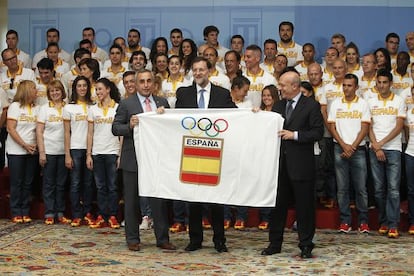Austerity knocks on the door of sports governing bodies
Budget cuts mean underachievers will lose funding

Spain’s CSD Sports Council has told the country’s athletes to prepare themselves for drastic cuts to state subsidies, saying that funding will be focused on sports that win medals.
Miguel Cardenal, the head of the CSD, has met with the presidents of the country’s 66 sports federations, including those for disabled athletes, to warn them that the 2013 budget will see “an important reduction” in state funding that in some cases could be as much as 50 percent.
Many smaller federations who found it hard to attract commercial sponsors relied heavily on public money and, with less cash available, performance and results were bound to be affected over the longer term, Cardenal admitted on Friday.
“Subsidies have already seen a very significant reduction in recent years and this is affecting the activities of the federations,” he added.
The future of sport in this country will no longer depend on subsidies"
Cardenal has called on sports federations to prepare an austerity plan outlining the cuts they intend to make, along with proposals to generate funding via non-government sources by October.
The news comes as no surprise to the country’s sports federations. The CSD’s budget was cut by a third this year, to 111.3 million euros. The next spending plan will see new rules regarding the amount federations receive based on the performance of their athletes in the Olympic Games and other international competitions in order to “optimize their resources.”
This means that federations will have no option but to try to generate money through the private sector. “The idea is being increasingly accepted by young people in the sports federations that the future of sport in this country will no longer depend on subsidies,” says Cardenal.
Athletics has traditionally received the lion’s share of state funding — some 6.2 million euros in 2011, making up around half of its budget. Based on the new criteria, Spanish track & field athletes, who came home from the London Games without a single medal, can expect a major cut in funding.
The organizers of the 2014 Word Cycling Championships, due to be held in the northwestern town of Ponferrada, have already said that they will be looking to the private sector to provide the five million euros needed to host the event.
At the other end of the scale, the taekwondo federation, which has long complained of being underfunded, will see more money coming its way following the three medals its practitioners garnered in London.
At the same time, the spending cuts will limit the number of sporting events that Spain will be able to host in the coming years: the country is due to stage the world handball and swimming championships next year, following by those of cycling and basketball in 2014. The CSD has said that it cannot guarantee being able to back the events, and accepts that there is “a certain unease” among the relevant sports federations.
But Cardenal gave his “unconditional support” for Madrid’s third attempt to host the Olympic Games, this time for 2020, saying that the economic benefits they would bring to the Spanish capital “have been proven.”
Tu suscripción se está usando en otro dispositivo
¿Quieres añadir otro usuario a tu suscripción?
Si continúas leyendo en este dispositivo, no se podrá leer en el otro.
FlechaTu suscripción se está usando en otro dispositivo y solo puedes acceder a EL PAÍS desde un dispositivo a la vez.
Si quieres compartir tu cuenta, cambia tu suscripción a la modalidad Premium, así podrás añadir otro usuario. Cada uno accederá con su propia cuenta de email, lo que os permitirá personalizar vuestra experiencia en EL PAÍS.
¿Tienes una suscripción de empresa? Accede aquí para contratar más cuentas.
En el caso de no saber quién está usando tu cuenta, te recomendamos cambiar tu contraseña aquí.
Si decides continuar compartiendo tu cuenta, este mensaje se mostrará en tu dispositivo y en el de la otra persona que está usando tu cuenta de forma indefinida, afectando a tu experiencia de lectura. Puedes consultar aquí los términos y condiciones de la suscripción digital.








































